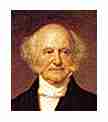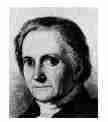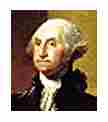Biographies - V through Z
 VAN BUREN,
Martin, a Senator from New York and a Vice President and 8th President of the United States; born in Kinderhook, Columbia County, N.Y., December 5, 1782; attended the village schools; studied law; was admitted to the bar and commenced practice in Kinderhook, N.Y., in 1803; moved to Hudson, N.Y., in 1809; surrogate of Columbia County 1808-1813; member, State senate 1813-1820; attorney general of New York 1816-1819; delegate to the State constitutional convention in 1821; elected to the United States Senate; reelected in 1827, and served from March 4, 1821, until December 20, 1828, when he resigned, having been elected Governor; chairman, Committee on the Judiciary (Eighteenth through Twentieth Congresses); Governor of New York from January to March 1829, when he resigned to enter the Cabinet; appointed Secretary of State in the Cabinet of President Andrew Jackson and served from March 1829, until his resignation, effective May 1831, when he was commissioned Minister to Great Britain; the Senate rejected his nomination in January 1832, and he returned to the United States; elected, as a Democrat, Vice President of the United States on the ticket with Andrew Jackson and served from March 4, 1833, to March 3, 1837; elected, as a Democrat, President of the United States and served from March 4, 1837, to March 3, 1841; unsuccessful candidate for reelection as President on the Democratic ticket in 1840 and on the Free-Soil ticket in 1848; withdrew from political life and retired to his country home, 'Lindenwald,' in Kinderhook, N.Y., where he died July 24, 1862; interment in Kinderhook Cemetery.
VAN BUREN,
Martin, a Senator from New York and a Vice President and 8th President of the United States; born in Kinderhook, Columbia County, N.Y., December 5, 1782; attended the village schools; studied law; was admitted to the bar and commenced practice in Kinderhook, N.Y., in 1803; moved to Hudson, N.Y., in 1809; surrogate of Columbia County 1808-1813; member, State senate 1813-1820; attorney general of New York 1816-1819; delegate to the State constitutional convention in 1821; elected to the United States Senate; reelected in 1827, and served from March 4, 1821, until December 20, 1828, when he resigned, having been elected Governor; chairman, Committee on the Judiciary (Eighteenth through Twentieth Congresses); Governor of New York from January to March 1829, when he resigned to enter the Cabinet; appointed Secretary of State in the Cabinet of President Andrew Jackson and served from March 1829, until his resignation, effective May 1831, when he was commissioned Minister to Great Britain; the Senate rejected his nomination in January 1832, and he returned to the United States; elected, as a Democrat, Vice President of the United States on the ticket with Andrew Jackson and served from March 4, 1833, to March 3, 1837; elected, as a Democrat, President of the United States and served from March 4, 1837, to March 3, 1841; unsuccessful candidate for reelection as President on the Democratic ticket in 1840 and on the Free-Soil ticket in 1848; withdrew from political life and retired to his country home, 'Lindenwald,' in Kinderhook, N.Y., where he died July 24, 1862; interment in Kinderhook Cemetery.
![]()
 WASHINGTON, Bushrod, lived in the shadow of his uncle, George Washington, and never quite distanced himself from the spector of his uncle's influence. Bushrod surely acheived a measure of prominence if not distinction, reaching the nation's highest court as its eleventh justice. But Bushrod Washington was never in the same league as George.
WASHINGTON, Bushrod, lived in the shadow of his uncle, George Washington, and never quite distanced himself from the spector of his uncle's influence. Bushrod surely acheived a measure of prominence if not distinction, reaching the nation's highest court as its eleventh justice. But Bushrod Washington was never in the same league as George.
A "short, untidy man who liked snuff and suffered from ill health," Washington was born on June 5, 1762, in Westmoreland County, Virginia. Studious in his youth, Bushrod Washington began to hobnob with the famous thinkers of his time while at the College of William and Mary, from which he graduated at age sixteen. There he shared classes with future Chief Justice John Marshall.
Bushrod Washington's books and quill pens were soon replaced by rifles and ammunition when he joined the army towards the end of the Revolutionary War. After the British waved the white flag and his soldiering days were over, Uncle George sponsored Bushrod a law apprentice.
An interest in politics led Bushrod to the Virginia House of Delegates in 1787 and also to the Virginia ratifying convention for the Constitution. However, the thrill of the campaign trail faded fast, and he returned to private law practice and teaching in 1790. Such activities were his passions, and he may have never entered the national political scene again if not for his uncle George, who strongly encouraged his nephew to run for the Virginia legislature in 1798. Bushrod reluctantly agreed.
B. Washington's days as an elected state official were not to be. In the year of the would-be campaign, Supreme Court Justice James Wilson died creating a vacancy on the High Bench. Washington and Marshall were the two replacement candidates on President John Adams' short list of Federalist Virginians. When Marshall refused the position, B. Washington received the nod. He was only thirty six years old when he took the oath of office on February 4, 1799.
Washington was not a distinguished justice. Pundits classify his performance as average to forgettable, and Washington's written opinions during his 30+ years on the bench were few and far between. Rather than speak out, Washington proved a loyal follower of Chief Justice John Marshall. Washington disagreed with Marshall only three times during the years they shared on the bench.
If anything, it was Bushrod's life outside the Court that caused the most excitement in his time. George Washington left his entire estate at Mount Vernon to his nephew, making his wishes known that the Mount Vernon slaves there were to be freed. Bushrod followed his uncle's instructions, but then he brought his own slaves to Mount Vernon, selling them on the block when money troubles arose. Bushrod Washington, who believed in African resettlement for blacks, was promptly attacked by abolitionists and others for not following his uncle's example.
Bushrod Washington died Nov. 26, 1829 as he had spent most of his adult life - working at the law, this time on circuit court duty in Philadelphia. His bereaved wife died just three days later while transporting his body for burial.
![]()
 WASHINGTON, George, a Delegate from Virginia and first President of the United States; born at "Wakefield," near Popes Creek, Westmoreland County, Va., February 22, 1732; raised in Westmoreland County, Fairfax County and King George County; attended local schools and engaged in land surveying; appointed adjutant general of a military district in Virginia with the rank of major in 1752; in November 1753 was sent by Lieutenant Governor Dinwiddie, of Virginia, to conduct business with the French Army in the Ohio Valley; in 1754 was promoted to the rank of lieutenant colonel and served in the French and Indian war, becoming aide-de-camp to General Braddock in 1755; appointed as commander in chief of Virginia forces in 1755; resigned his commission in December 1758 and returned to the management of his estate at Mount Vernon in 1759; served as a justice of the peace, 1760-1774, and as a member of the Virginia house of burgesses, 1758-1774; delegate to the Williamsburg convention of August 1774; Member of the First and Second Continental Congresses in 1774 and 1775; unanimously chosen June 15, 1775, as commander in chief of all the forces raised or to be raised; commanded the Continental armies throughout the war for independence; resigned his commission December 23, 1783, and returned to private life at Mount Vernon; was delegate to, and president of, the Federal Convention in Philadelphia in 1787; unanimously elected as the first President of the United States, being inaugurated April 30, 1789, in New York City; unanimously reelected in 1792 and served until March 3, 1797, after declining a renomination; again appointed as lieutenant general and commander of the United States Army July 3, 1798, and served until his death December 14, 1799, in Mount Vernon, Va.; interment in the vault at Mount Vernon.
WASHINGTON, George, a Delegate from Virginia and first President of the United States; born at "Wakefield," near Popes Creek, Westmoreland County, Va., February 22, 1732; raised in Westmoreland County, Fairfax County and King George County; attended local schools and engaged in land surveying; appointed adjutant general of a military district in Virginia with the rank of major in 1752; in November 1753 was sent by Lieutenant Governor Dinwiddie, of Virginia, to conduct business with the French Army in the Ohio Valley; in 1754 was promoted to the rank of lieutenant colonel and served in the French and Indian war, becoming aide-de-camp to General Braddock in 1755; appointed as commander in chief of Virginia forces in 1755; resigned his commission in December 1758 and returned to the management of his estate at Mount Vernon in 1759; served as a justice of the peace, 1760-1774, and as a member of the Virginia house of burgesses, 1758-1774; delegate to the Williamsburg convention of August 1774; Member of the First and Second Continental Congresses in 1774 and 1775; unanimously chosen June 15, 1775, as commander in chief of all the forces raised or to be raised; commanded the Continental armies throughout the war for independence; resigned his commission December 23, 1783, and returned to private life at Mount Vernon; was delegate to, and president of, the Federal Convention in Philadelphia in 1787; unanimously elected as the first President of the United States, being inaugurated April 30, 1789, in New York City; unanimously reelected in 1792 and served until March 3, 1797, after declining a renomination; again appointed as lieutenant general and commander of the United States Army July 3, 1798, and served until his death December 14, 1799, in Mount Vernon, Va.; interment in the vault at Mount Vernon.
![]()
WHITE, Robert, Judge of the Superior Court of Law, District of Virginia, Berkeley County.
|
This Internet Presentation is Copyright 13th-amendment.org
Documents presented on this site are the property of their respective authors as
credited.
Please contact them for reprint permissions. contact
[Project 13 Email] |